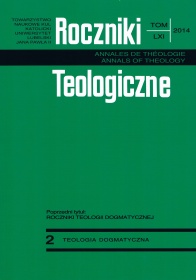Communion Dimension of the Human Person
Abstract
Contemporary philosophy and theology includes personal and interpersonal reality of the human being and it has given a new interpretation of the human person. A man reflects the essence of communication and communion of God, which also causes the communication and communion dimension of being a human person. A person is relational and ecstatic. The Old Testament does not apply the concept of communion to the relationship of man and God, and only the Incarnation led to a breakthrough in this respect. The theological concept of a person has developed over a long period of Trinitarian and Christological disputes. The image of God and the relationship between Him and the people had a huge impact on this issue. Contemporary theological anthropology often focuses on the combination of issues connected with the Trinity and communion. On the basis of it not only substantial personology but also relational personology developed. There was a significant effect of dialogical personalism, which also marked the theology of communion, on the basis of which you can work out a communion vision of the human person.
References
Bartnik Cz. S., Personalizm, Lublin 2000.
Biela B., Koinonia, w: Encyklopedia Katolicka, t. IX, Lublin 2002, kol. 302.
Dec I., Personalizm w filozofii (próba systematyzacji), http://www.stfwp.pl/pub/ pdf/dec.pdf.
Eicher P., Die anthropologische Wende. Karl Rahners philosophischer Weg vom Wesen des Menschen zur personaler Existenz, Freiburg (Schweiz) 1970.
Gacka B., Znaczenie osoby w teologii Josepha Ratzingera Benedykta XVI, Warszawa 2010.
Goleń J., Motywy zawarcia małżeństwa sakramentalnego. Studium z duszpasterstwa rodzin w świetle badań narzeczonych, Lublin 2013.
Granat W., Personalizm chrześcijański. Teologia osoby ludzkiej, Poznań 1985.
Greshake G., Trójjedyny Bóg. Teologia trynitarna, tłum. J. Tyrawa, Wrocław 2009.
Hainz J., Koinonia. I. Biblisch-theologisch, w: W. Kasper u. a. (Hg.), Lexikon für Theologie und Kirche, Bd. VI, Freiburg-Basel-Rom-Wien 1997, s. 171 n.
Hryniewicz W., Pascha Chrystusa w dziejach człowieka i Wszechświata. Zarys chrześcijańskiej teologii paschalnej, t. 3, Lublin 1991.
Jagodziński M., Chrystologia komunijna, „Studia Theologica Varsaviensia” 46(2008), nr 1, s. 67-79.
Jagodziński M., Communio dzięki komunikacji. Teologiczny wymiar teorii komunikatywnego działania w eklezjologii Medarda Kehla SJ, Radom 2002.
Jagodziński M., Eklezjalne kształty komunii, Radom 2012.
Jagodziński M., Komunijna wizja Kościoła według Medarda Kehla SJ, Kraków 2009.
Jagodziński M., Sakramenty komunii, „Ruch Biblijny i Liturgiczny” 4(2009), s. 285-293.
Jagodziński M., Sakramenty w służbie communio. Studium teologiczno-komunikacyjne, Warszawa 2008.
Jagodziński M., Teologia a komunikacja, „Studia Theologica Varsaviensia” 41(2003), nr 2, s. 73-102.
Jagodziński M., Teologiczne znaczenie pojęcia koinonia, „Zeszyty Formacji Katechetów” 11(2011), nr 3(43), s. 30-35.
Jagodziński M., Węzłowe zagadnienia chrystologii komunijnej, Radom 2013.
Jan Paweł II, List apostolski Mulieris dignitatem (1988).
Kudasiewicz J., Koinonia w Nowym Testamencie, w: A. Czaja, M. Marczewski (red.), Communio w chrześcijańskiej refleksji o Kościele, Lublin 2004, s. 55-77.
Kuhnke U., Koinonia. Zur theologischen Rekonstruktion der Identität christlicher Gemeinde, Düsseldorf 1992.
Kunka S., Teologiczna wizja cielesności człowieka w nauczaniu Karola Wojtyły Jana Pawła II, Lublin 2012.
Lachner R., Communio eine Grundidee des christlichen Glaubens. Ein Beitrag zur Elementarisierung im Fach Dogmatik, w: R. Lachner, E. Spiegel (Hg.), Qualitätsmanagement in der Theologie. Chancen und Grenzen einer Elementarisierung im Lehramtsstudium, Kevelaer 2003, s. 225-251.
Migut B., Komunia. 3. W teologii, w: Encyklopedia Katolicka, t. IX, Lublin 2002, kol. 493 n.
Pesch (). H., Rollenumbrüche. Über den Verlust und Wandel der Rollenidentität bei Seelsorgern, „Theologisch-praktische Quartalschrift” 4(2012), s. 271-290.
Perzyński A., Włoska antropologia teologiczna. Studium historyczno-dogmatyczne, Łódź 2012.
Ratzinger J., Wprowadzenie w chrześcijaństwo, tłum. Z. Włodkowa, Kraków 1994.
Rusecki M., Personalizm. II. W teologii, w: Encyklopedia Katolicka, t. XV, Lublin 2011, kol. 338-341.
Sawa R.. Komunia. 1. Termin, w: Encyklopedia Katolicka, t. IX, Lublin 2002, kol. 492 n.
Schneider T., Znaki bliskości Boga. Zarys sakramentologii, tłum. J. Tyrawa, Wrocław 1990.
Scola A., Osoba ludzka. Antropologia teologiczna, Poznań 2005.
Seckler M., Die Communio-Ekklesiologie, die theologische Methode und die Loci-theologici-Lehre Melchior Canos, w: A. Proniewski, A. M. Jakoniuk, A. Dębski (red.), In Eo qui confortat, Białystok 2009, s. 209-232.
Sienkiewicz E., Wspólnota Kościoła, Szczecin 2013.
Smuniewski C., Wspólnota łaski. Charytologiczno-trynitarna eklezjogeneza, Kraków 2013.
Szymik J., Theologia benedicta, t. II, Katowice 2012.
Valverde C., Antropologia filozoficzna, Poznań 1998.
Watzlawick P., Beavin J. H., Jackson D. D.. Menschliche Kommunikation. Formen, Störungen, Pradoxien, Bern-Stuttgart-Toronto 1990.
Copyright (c) 2014 Roczniki Teologiczne

This work is licensed under a Creative Commons Attribution-NonCommercial-NoDerivatives 4.0 International License.





